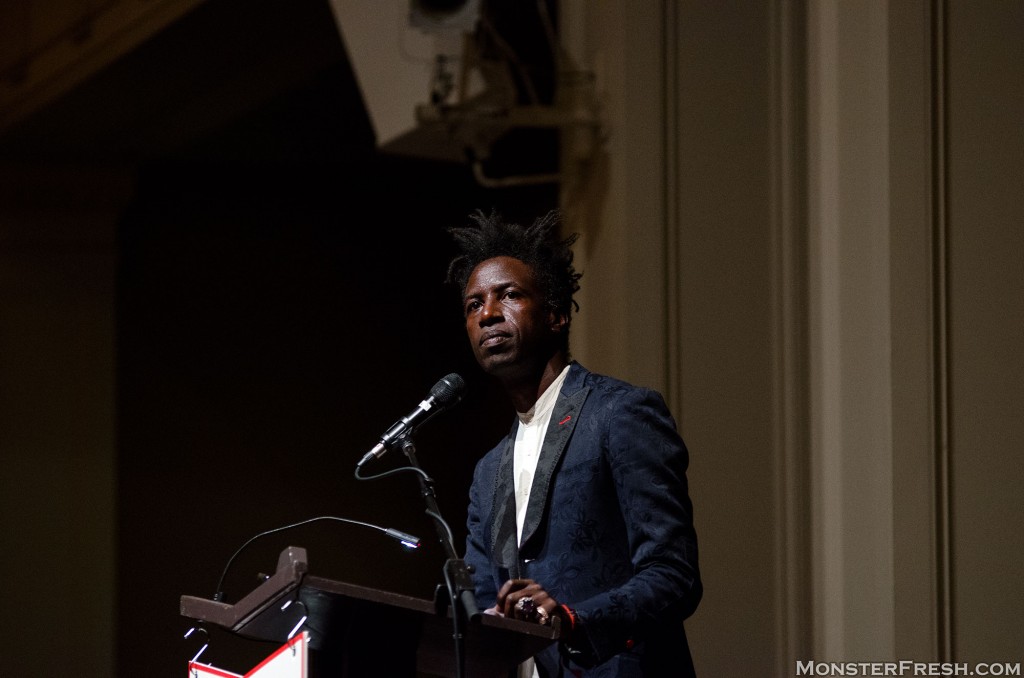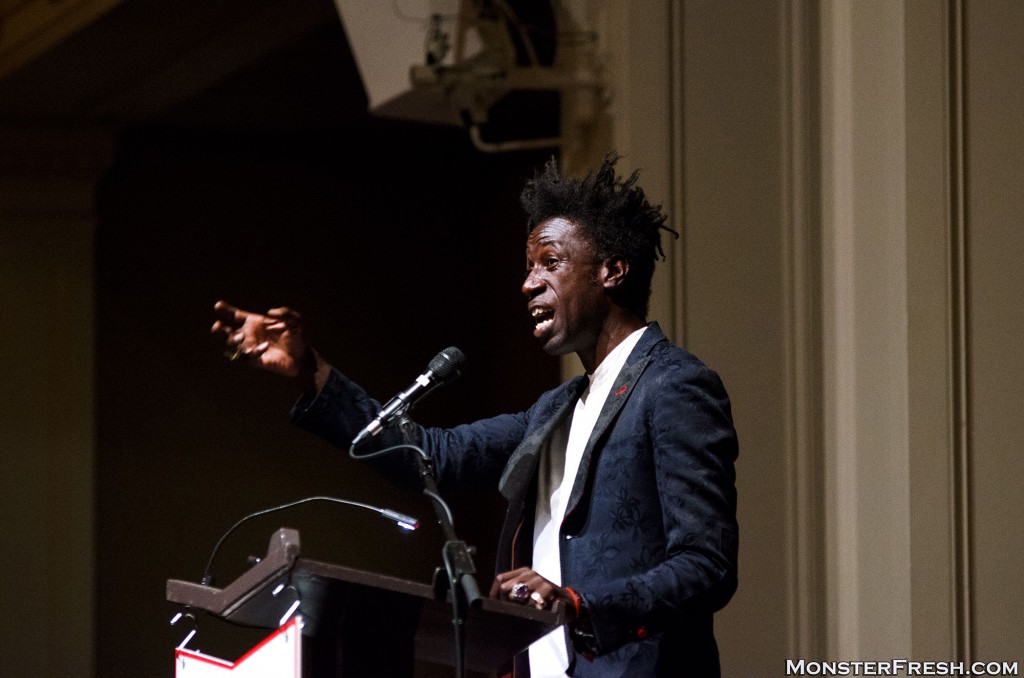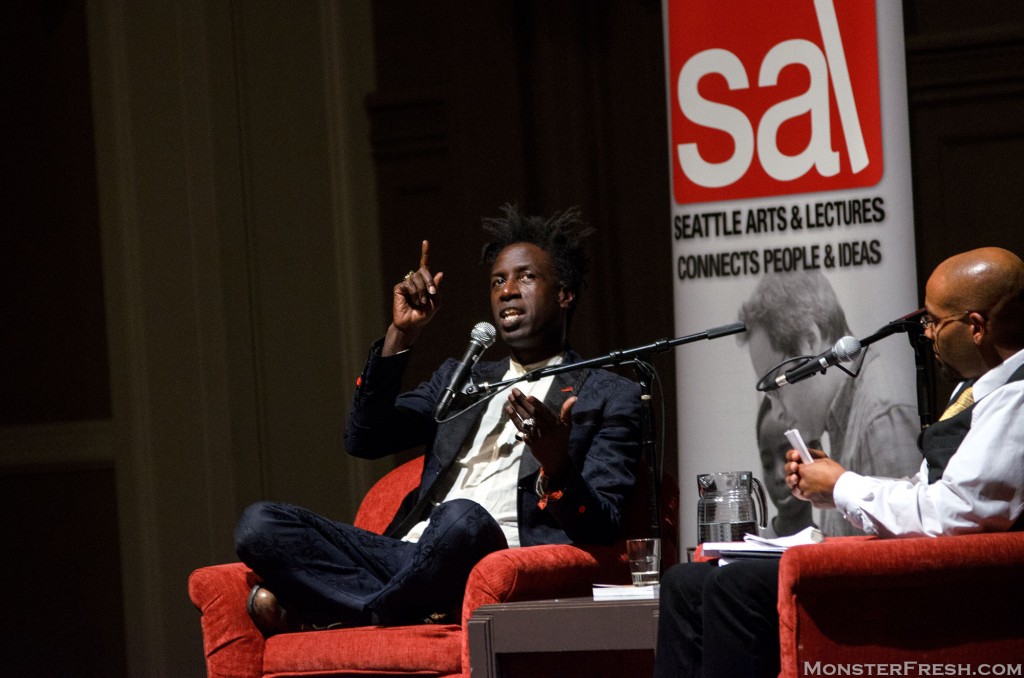Two Pennies for a Thought: An Evening w/Saul Williams @ Town Hall [Seattle]
The legendary slam poet/actor/author/musician/artist returns to seattle to promote his new poetry book,US(a.), & upcoming multi-media project, Martyr Loser King

An Evening With Saul Williams
Town Hall
Seattle, Wa
9.24.2015
Last month, Seattle Arts & Lectures hosted slam poet/musician/actor/writer/artist, Saul Williams for a night of poetry readings followed by an interview. The 43-year-old is currently touring to promote his new book of poetry, US(a.), and upcoming album, Martyr Loser King, the two most recent works added to a diverse portfolio that spans genres, styles, and artistic mediums, over a 20 year career. On this night, the artist known as Saul Williams allowed us to meet Saul Williams the person, revealing that both were one and the same.
Arriving for the meeting at Town Hall, a former Christian Science Church from the 1920s-turned cultural center and performance venue, felt just like… well, a town hall meeting. Attendees filed through the wooden pews of a space that proved larger than I expected. I picked a spot in back of the first section of rows and discovered that Thurston Moore, lead singer/guitarist of alternative rock pioneers, Sonic Youth, was sitting directly in front of me. He and hundreds of others turned out for what seemed a promising event.
The night commenced not with Saul Williams, but a young poet from the area. She recited her poem, “Black Boy,” an empowering address on African American Identity. Shortly after this first act, a local academic and fan, who would be moderating the evening, introduced Saul, who then took the podium. Sporting a blue blazer, Williams looked like a tenured professor; we, the audience, remained silent and paid attention, just like undergrads at a review session for the cumulative final. Hardly wasting a second before diving right into it, he spent the hour reading and reciting text from US(a.), as well as his previous books of poetry — most notably, pieces from Said the Shotgun to the Head [2003] — and various musical projects. Much more than a simple reading, “hip hop’s poet laureate” wielded the bravado, tenacity, and determination of someone trying to lift the crowd up. He set beats to air and conducted rhythm with his body; he measured and cadenced his lines. Williams wasn’t “reading” or “reciting,” he was performing.

Attending a Saul Williams performance will make you a (pro)active listener, meaning that you get in what you put out. He verbalizes reality as he sees it and, sometimes, the weight that his words carry increase the more that you listen.
A few passages that stuck:
“Beliefs are police of the mind, which is to say ‘Fuck the beliefs.’”
– “Fck the Beliefs,” from Chorus: A Literary Mixtape [2012]
“The greatest Americans have not been born yet/ They are waiting for the past to die… We will wait through the degenerate course of your repeated history/ We will wait for the past to die.”
– “Bloodletting,” from the Not in my Name EP [2003]
“What my fame affords me/ I will use to spread the light… There are ways of our saying things/ That shape truth into poems.”
– “As if Thighs Were Parentheses,” from US(a.) [2015]
Several lines out of hundreds that I tried to write down.
Williams interspersed his readings with candid asides to the audience, ranging from commentary on his art to personal sentiments on whatever floated to the surface. The writing of US(a.) was initiated surrounding his return to the United States, after a 4-year stint of living in Paris, from 2009 – 2013. While introducing the genesis of the book, the author remarked, “I was commissioned to write about America, and I thought, ‘Well, haven’t I been writing about America?’” He actually answered his own rhetorical question later, when discussing artistic style: “You’ll notice that I have a lot of recurring themes in my work—it’s ’cause there’s still all the same fucked up shit.” He treated situations like these with the kind of blunt openness that jives well with people. Sure enough, audience members laughed and voiced their agreement back at him. His honesty seemed sincere enough to believe, which isn’t always the case with people in his position. To some extent, I think that these scattered anecdotes offered the most insight into how Williams views himself as an artist — the only title that he seems truly comfortable embracing. At the very least, his comments fulfilled the unintended dramatic role of foreshadowing the Q&A period.
From spoken word, he proceeded to song, giving an impromptu a capella recital. Williams first sang “Burundi,” the debut single off his upcoming, ever-evolving concept album/rock opera multi-media project, Martyr Loser King (there’s even a graphic novel component, involved). He broke out of the gate with the intensity of a full ensemble, swaying verses and forcefully hammering the chorus (the main protagonist’s declaration of resilience): “I’m a candle, I’m candle/ Chop my neck a million times, I still stand and burn bright, yo/ I’m a candle.” This off-the-cuff performance enthralled the audience, who collectively requested another song. In response, Saul Stacey Williams followed up with one of his earliest songs, “Black Stacey,” featured on his self-titled sophomore release from 2004. Both performances went over really well, a difficult task considering that he stayed in key, maintained rhythm, and still showed some grit. The songs themselves formed a career arc, “Black Stacey” a powerful anthem about race and self image that Williams, supposedly, wrote in high school, and “Burundi,” the ultimate declaration that change is coming, and that it moves forward.
Moments after Saul finished his set, the moderator advanced to the stage, and the focus shifted to a pair of chairs that had been arranged off to the side of the podium. Due to time constraints, the interview commenced immediately. Williams meditated over each inquiry and responded with ease and candor. It’s funny how watching an artist answer questions about themselves can seem like an extension of their creative process, and that hearing something profound can become an expectation. When listening to Saul Williams, you take it for granted, and with good reason. One question asked what the responsibilities are of artists who have “made it” and found success. Williams’ take was as follows:
“Find the ways to harmony within yourself. To continue growing, to remain a student, to keep challenging yourself to grow, to think, to rethink, to relearn and unlearn, to explore, to talk to strangers, to read, to realize that your diet is more than what you eat, what you read, what you choose to talk about, what you think about. Challenge yourself beyond what’s given.”
His response was abstract, but sobering. He retorted that the responsibility of the artist is no different than anybody else’s. After all, artists are no different than everyone else.

A few questions seemed too general — Larry King-esque, even — but Williams worked with whatever came his way. For example, his advice on becoming a good writer? “Read.” He went on to elaborate, but that statement had already said it all. Someone asked about how Saul manages to stay positive and hopeful in a world filled with so many fucked up things. He responded by reminding the audience that having a family—more so his dedicated partner than his kids, these days, who he referred to as “adolescents”—always helps, and cautioned us to remember that life itself is, actually, pretty decent. The Q&A session was rushed, and too few questions were taken, but it’s hard to complain when the dude had already given us two solid hours of poetry, singing, socio-political commentary, and open self-reflection; not to mention, friendly banter.
Saul Williams spoke, we listened, and I believed him. Still, it’s hard to gauge the honesty of someone who you absolutely expect it from. Williams didn’t just appear honest, though; he was uncompromising in appearing so. What he said and did, his dancing and gesticulations, his tone and attitude; they all betrayed the thoughts and feelings of someone who would present it his way, or not at all. “I consider my work the residue of the work that I do on myself.” True to his word, Saul Williams embodied art itself. His art, himself.
Really good read! Easy and descriptive. Felt as if I was right in the pews with the author. The ending was hilarious as in my head I started thinking of this gathering as a cult but overall really enjoyed the tone and information of this piece.